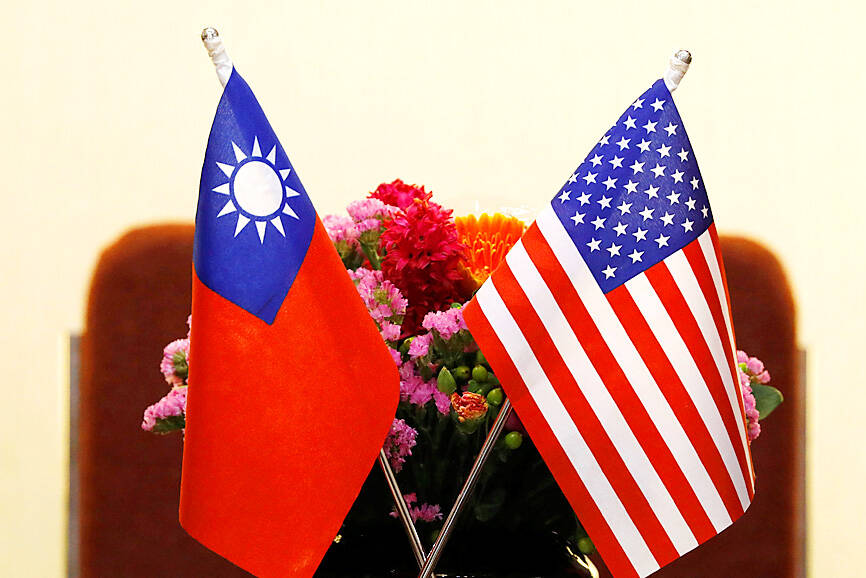Taiwan and the US on Friday celebrated the second anniversary of a language education initiative that aims to encourage more Americans to learn Mandarin at Taiwanese study centers as China’s language and cultural centers close across the US.
“Over the past two years, we have significantly increased Mandarin and English language learning and exchange opportunities. Here’s to the future!” the US Department of State’ Bureau of Educational and Cultural Affairs wrote on Twitter.
Attached to the post was a graphic that showed that the number of US students in the bureau’s exchange programs in Taiwan has increased to about 130 from 90 over the two years since the initiative was launched on Dec. 3, 2020.

Photo: Tyrone Siu, Reuters
The number of students attending the US-sponsored Mandarin programs is expected to rise to nearly 190 by the end of next year, the graphic showed.
“Taiwan-US Education Initiative is growing from strength to strength and we hope to tell more stories about Taiwan in the years to come,” the Taipei Economic and Cultural Representative Office (TECRO) in the US wrote in response.
The office, Taiwan’s de facto embassy in the US, followed that with a short video to introduce the Learn and Study in Taiwan Web site, which provides information on how to access to Mandarin learning courses in Taiwan and the US.
The US-Taiwan Education Initiative aims to expand collaboration in the area of language education and to safeguard academic freedom.
“The initiative will highlight and enhance Taiwan’s role in providing Chinese language instruction to Americans and to people around the world,” then-American Institute in Taiwan director Brent Christensen said at its launch.
The initiative grew as the US began to close Beijing-supported Confucius Institutes, which were Chinese language and cultural learning centers that some governments have said are intended to extend China’s influence abroad.
As of June 21, there were “104 Confucius Institutes that have closed or are in the process of closing” in the US, the National Association of Scholars said, adding that 18 remain.
The number of Taiwan Centers for Mandarin Learning in the US is growing, with 34 being established so far, TECRO said.
With an increasing number of US students learning Mandarin at Taiwan’s language centers, the office hopes that Taiwan can broaden its influence overseas by teaching Americans about Taiwan’s democratic society and pluralistic culture, and facilitate greater cooperation between the two countries.

Alain Robert, known as the "French Spider-Man," praised Alex Honnold as exceptionally well-prepared after the US climber completed a free solo ascent of Taipei 101 yesterday. Robert said Honnold's ascent of the 508m-tall skyscraper in just more than one-and-a-half hours without using safety ropes or equipment was a remarkable achievement. "This is my life," he said in an interview conducted in French, adding that he liked the feeling of being "on the edge of danger." The 63-year-old Frenchman climbed Taipei 101 using ropes in December 2004, taking about four hours to reach the top. On a one-to-10 scale of difficulty, Robert said Taipei 101

Nipah virus infection is to be officially listed as a category 5 notifiable infectious disease in Taiwan in March, while clinical treatment guidelines are being formulated, the Centers for Disease Control (CDC) said yesterday. With Nipah infections being reported in other countries and considering its relatively high fatality rate, the centers on Jan. 16 announced that it would be listed as a notifiable infectious disease to bolster the nation’s systematic early warning system and increase public awareness, the CDC said. Bangladesh reported four fatal cases last year in separate districts, with three linked to raw date palm sap consumption, CDC Epidemic Intelligence

Taiwanese and US defense groups are collaborating to introduce deployable, semi-autonomous manufacturing systems for drones and components in a boost to the nation’s supply chain resilience. Taiwan’s G-Tech Optroelectronics Corp subsidiary GTOC and the US’ Aerkomm Inc on Friday announced an agreement with fellow US-based Firestorm Lab to adopt the latter’s xCell, a technology featuring 3D printers fitted in 6.1m container units. The systems enable aerial platforms and parts to be produced in high volumes from dispersed nodes capable of rapid redeployment, to minimize the risk of enemy strikes and to meet field requirements, they said. Firestorm chief technology officer Ian Muceus said

MORE FALL: An investigation into one of Xi’s key cronies, part of a broader ‘anti-corruption’ drive, indicates that he might have a deep distrust in the military, an expert said China’s latest military purge underscores systemic risks in its shift from collective leadership to sole rule under Chinese President Xi Jinping (習近平), and could disrupt its chain of command and military capabilities, a national security official said yesterday. If decisionmaking within the Chinese Communist Party has become “irrational” under one-man rule, the Taiwan Strait and the regional situation must be approached with extreme caution, given unforeseen risks, they added. The anonymous official made the remarks as China’s Central Military Commission Vice Chairman Zhang Youxia (張又俠) and Joint Staff Department Chief of Staff Liu Zhenli (劉振立) were reportedly being investigated for suspected “serious